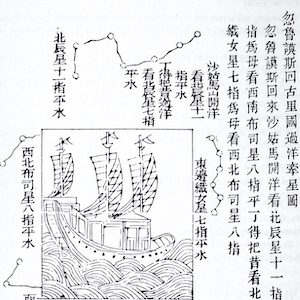Primer: Oceans
Overview
Oceans, which cover approximately 70 percent of the earth’s surface, have played a crucial role in shaping human history. Using oceans and seas as a unit for analysis is, however, a relatively new framework for historical analysis. The traditional units of historical analysis include civilizations, continents and especially nation-states. The Cold War expanded these units by encouraging historians to think in terms of “areas” with lines drawn according to certain assumptions. This influenced what is now known as area studies, which divided the world into a set of clearly defined regions. In many ways, these divisions tell us more about contemporary politics than they do about the most effective organization of knowledge.
Essay
Some historians sought to break away from traditional area studies models by tracing larger processes that cut across national or regional boundaries. In 1949, Fernand Braudel published what became the first ‘ocean’ history, The Mediterranean and the Mediterranean World in the Age of Phillip II. Braudel had originally intended to write a straightforward history of the reign of Philip II of Spain but decided instead to move away from a conventional focus on politics, war or diplomacy to highlight the sometime invisible structures and processes that shaped history. Examining what he called the longue durée, or long duration, Braudel’s goal was to look not simply at individuals or events but to uncover larger patterns that recurred over long periods of time.
By taking this approach, Braudel was able to trace links that had been missed in past studies and to argue for the essential “unity and coherence of the Mediterranean region”. By examining the Mediterranean as not simply a body of water separating nation-states, but rather a complex network of inter-connected land masses and seas that do not have easy boundaries, Braudel suggested that it is possible to produce a more comprehensive vision of history that dismantles the arbitrary divisions imposed on it by the rise of nation states. To achieve this goal, Braudel drew on a diverse range of fields, including geography, climatology and archaeology. Thus, the first part of his monumental work focused on how human endeavor was framed by the landscape and environmental features.
Braudel’s approach provided a model for other historians seeking to cut across national boundaries to illuminate large processes of exchange. In an important 1999 article, Jerry Bentley argued that historians should pay attention to maritime regions they “bring focus to historical processes of commercial, biological and commercial exchange that other geographical concepts often obscure.” The ‘Oceans Connect’ project, undertaken at Duke University, attempted to do precisely this by regrouping area scholars around maritime basins, in this case the Indian Ocean, the ‘Eurasian Seas’, the Mediterranean and the Atlantic.
Since Braudel’s intervention, scholars have analyzed a range of oceans and seas including but certainly not limited to the Atlantic, the Pacific, and the Indian Oceans. While it is not possible to summarize their findings, this focus on maritime space has yielded a range of different methodologies. In a valuable article David Armitage identified three distinct ways to write Atlantic history. The first is circum-Atlantic history which Armitage defines as “the history of the Atlantic as a particular zone of exchange and interchange, circulation and transmission.” Such an approach, which is closest to Braudel’s original frame, examines the Atlantic as a whole, looking beyond national or imperial boundaries. Trans-Atlantic history, by contrast, relies on a comparative approach. It explores how the ocean created links and commonalities among peoples and regions that were once considered distinct. Finally, cis-Atlantic history investigates particular institutions, places, nations or regions in an Atlantic context, that is in relation to a wider Atlantic world.
As these categories show, there are many ways to use oceans and seas as a framework for analysis. As with any kind of historical analysis, a focus on oceans and seas can obscure where it should illuminate. In his 1999 article, Bentley for example critiqued the tendency of some Atlantic historians to “posit a de facto white Atlantic that brings British imperialism and migration in clear focus but makes little or no place for peoples of American or African ancestry.” Instead Atlantic history must include Africa as an indispensable part of this wider analysis. In 2006, Alison Games reiterated that the “most urgent and immediate challenge is to restore Africa to the Atlantic.” Since then, multiple studies have drawn Africa into a wider Atlantic world.
While the field continues to evolve and develop, what is clear is that a focus on oceans and seas open up new possibilities for historical scholarship that look, as Braudel did, beyond standard histories of nation states to illuminate larger processes.
Primary Sources
Bibliography
Alison Games, “Atlantic History: Definitions, Challenges, and Opportunities,” The American Historical Review 111, no. 3 (2006): 741–757.
Fernand Braudel, The Mediterranean and the Mediterranean World in the Age of Philip II (London: Collins, 1972).
Jerry H. Bentley, “Sea and Ocean Basins as Frameworks of Historical Analysis,” Geographical Review 89, no. 2 (1999): 215-224.
Armitage, David, David Armitage, and Michael J Braddick. 2002. “Three Concepts of Atlantic History”. In The British Atlantic World, 1500-1800, Basingstoke: Palgrave Macmillan , p. 11-27, 250-54.
Credits
This primer is based on an article written for the Monash-Warwick Global History reader. It was subsequently updated by Adam Clulow and Raymond Hyser.
